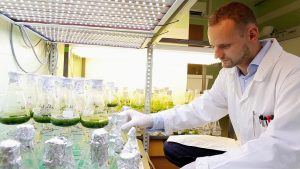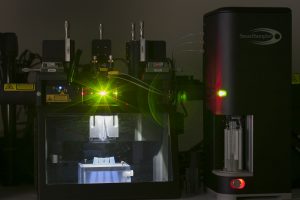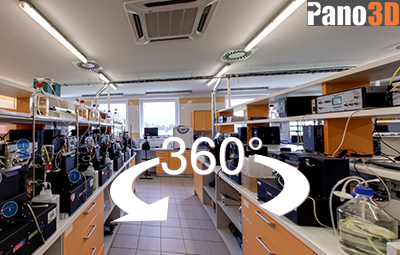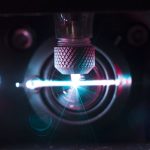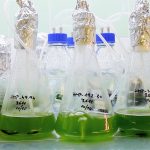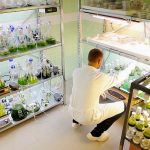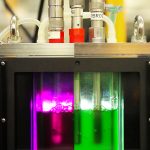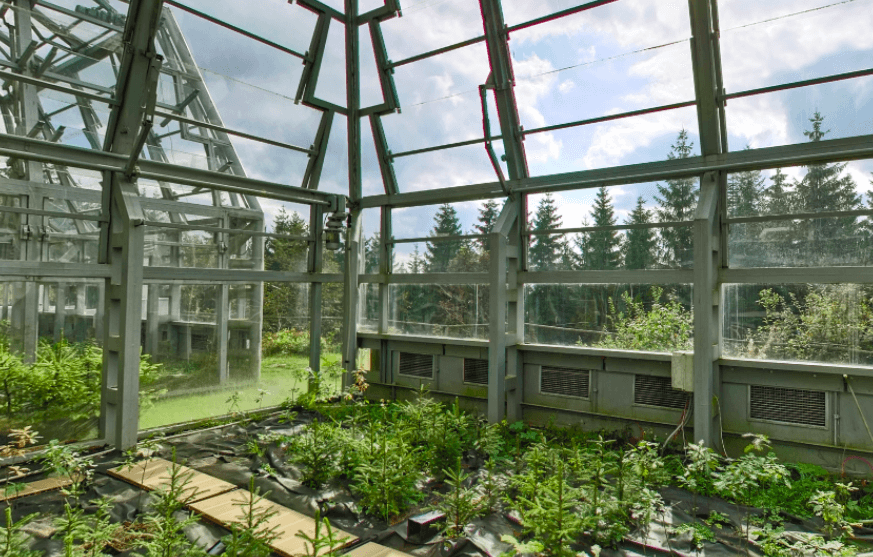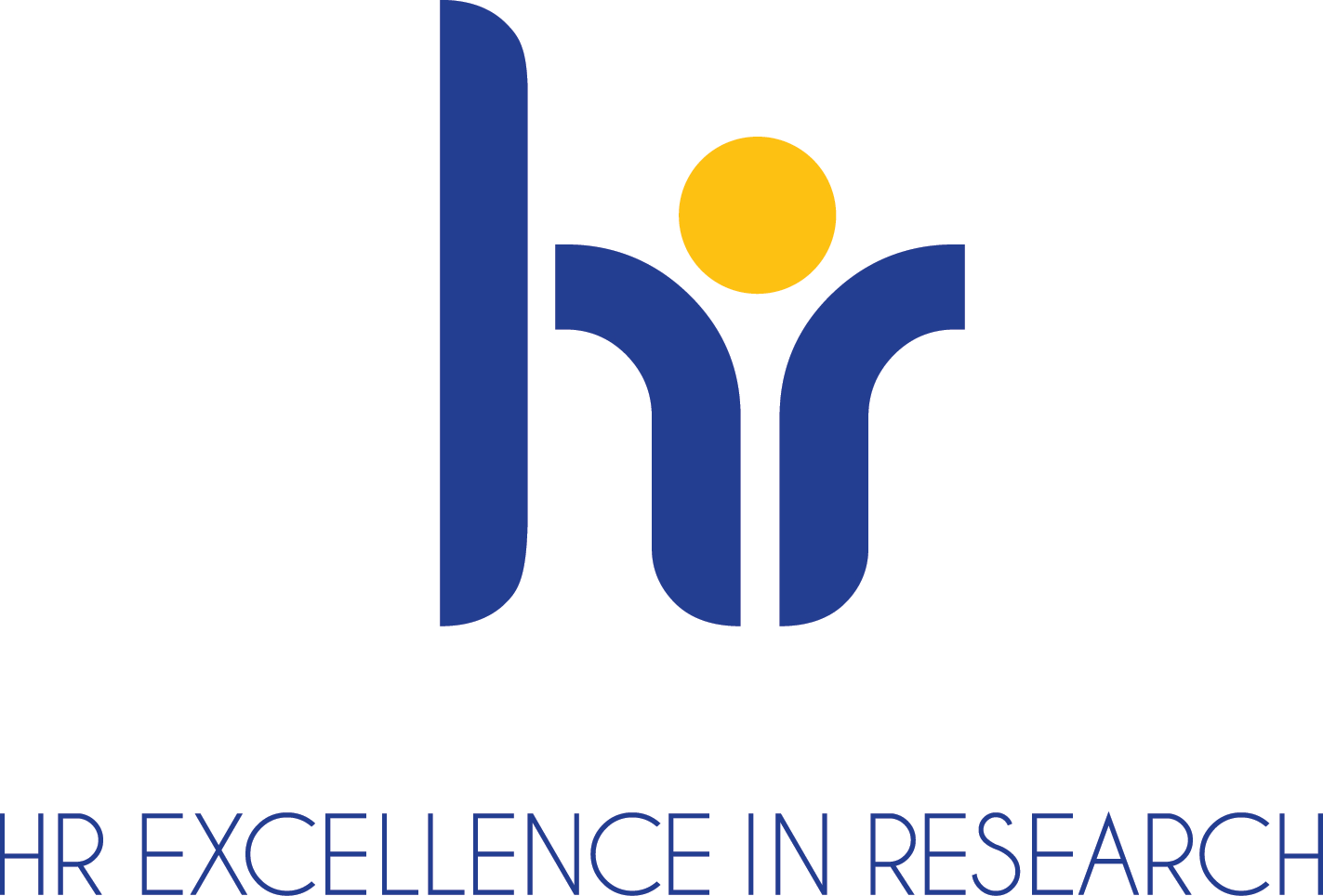Ing. Jan Červený, Ph.D. – head
Scientists:
RNDr. Diana Búzová, Ph.D.
Mgr. Lucie Kajan Grodecká, Ph.D.
Mgr. Petra Literáková
MFA David Šohaj Minařík
prof. Dr. Thomas Roitsch
Mgr. Roman Sándor, Ph.D.
Mgr. et Mgr. Anna Segečová, Ph.D.
Dr. Sopan Wagh
Mgr. Tomáš Zavřel, Ph.D.
Ph.D. students:
Mgr. Tomáš Zlámal
Others:
Iveta Jedličková
Motto:
“Our goal is to develop innovative biotechnological solutions using microalgae as effective cell factories that could be naturally incorporated into the daily activities of modern society and contribute to the sustainable development and prosperity of humankind without endangering the Earth’s resources.”
The work of the department combines advanced experimental techniques with systems biology approaches to investigate photosynthetic microorganisms and their interaction with the environment. The department’s activities aim to search for microorganisms (preferably the ones amenable to genetic transformation) that are provided with metabolic pathways leading to production or even secretion of energetically rich substances or substances with attractive bioactivity. The research line is focusing on investigation of stress and adaptive regulatory mechanisms as well as other physiological and biochemical properties of the identified microorganisms under conditions simulating a wide range of natural and industrial environments. For detailed description of the mechanisms and properties and also for optimization of value-added substance production capacity, we have developed an intelligent system for evolutionary optimization of biosystems that enables efficient characterization, phenotypization, genetic evolution (breeding) and optimization of photosynthetic microorganisms in simulated (aquatic) p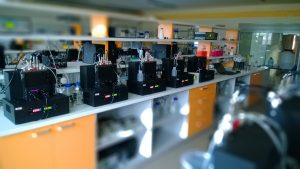 hotobioreactor environment and facilitates research on microorganisms with respect to their potential for biotechnological applications. Linking the system with artificial intelligence-based approaches allows for advanced optimization of the developed biotechnological procedures, which are subsequently tested at pilot-scale using standardized and prototype photobioreactors.
hotobioreactor environment and facilitates research on microorganisms with respect to their potential for biotechnological applications. Linking the system with artificial intelligence-based approaches allows for advanced optimization of the developed biotechnological procedures, which are subsequently tested at pilot-scale using standardized and prototype photobioreactors.
In order to expand our understanding of dynamic behavior of complex biological systems (represented in this case by photosynthetic microorganisms), we have been developing a web-based platform for photosynthetic process modeling (www.e-photosynthesis.org and www.e-cyanobacterium.org) in collaboration with the Systems Biology Laboratory, Masaryk University in Brno, led by Dr. David Šafránek. The platform provides easy and intuitive navigation through the structure of photosynthetic systems, storage and presentation of wet-lab experiments and unified representation of related biological networks. The platform serves both as an educational and a research-oriented tool.
The above-mentioned research activities include establishment of a constantly expanding collection of fully characterized photosynthetic microorganisms for biotechnological applications, suitable for both basic and applied research.
Keywords:
bioproduction, bioprospecting, biotechnology, plant cell cultures, evolutionary algorithms, phenotypization, fluorescence, photobioreactors, photosynthetic microorganisms, optimization, microalgae, cyanobacteria, systems biology, breeding, toxicology, cell sorting, artificial intelligence, high-throughput analysis
The department’s main activities are:
- Identification of strains suitable for production of selected value-added substances
- Application of advanced experimental techniques along with systems biology approaches to investigate photosynthetic microorganisms and their interactions with the environment
- Application of methods based on artificial intelligence and control theory for smart optimization and advanced automation to the developed biotechnological procedures
- Detailed characterization of investigated biological systems under a wide range of culturing conditions including natural conditions, predictive scenarios and conditions related to global change and industrial processes
- Studies of adaptive mechanism response to both optimal and extreme conditions
- Optimization of production conditions with respect to limitations of real large scale/industrial cultivation settings
- Application of controlled selective/evolutionary pressure (breeding) on different types of photosynthetic microorganisms aiming to raise their production capacity as well as their adaptivity to shifting environmental conditions
- Sorting of mixed populations and selection of subpopulations with “on demand” properties
- High-throughput fluorescence microscopy analysis of photosynthetic cultures at the single cell level
- Establishment and maintenance of a collection of biotechnologically promising strains
- Modeling of photosynthetic processes
- Development and design of technological solutions for microalgal biotechnology
- Development of a reference experimental platform for cross-laboratory validation experiments
- Development of methods for characterization, phenotypization and intelligent optimization of production and adaptive properties of investigated strains
- Development of methods and protocols customized for fluorescence marking of light-sensitive microorganisms
- Development of methods for quantitative analysis of morphological properties of cells and their physiological parameters such as cell viability, DNA topology and characterization of lipid droplet formation
- Development and optimization of high-throughput fluorescence methods for ecotoxicological studies of photosynthetic organisms
- Development of a computational platform for simulation of predictive experiments (in silico)
Projects:
Developed applications and tools:
- Set of control scripts for Photon Systems Instruments (PSI) bioreactor SW client
- Online tool for advanced analysis of PBR experimental data
- Online tool for calculating dissolved carbon system properties in seawater
- Online tool for image-based quantification of cell morphology
Photogallery:
Highlighted publications:
- Quantitative insights into the cyanobacterial cell economy
Zavřel T, Faizi M, Loureiro C, Poschmann G, Stühler K, Sinetova MA, Zorina A, Steuer R, Červený J
2019. eLife 8: e42508 - Influence of Circadian Clocks on Optimal Regime of Central C-N Metabolism of Cyanobacteria
Červený J, Šalagovič J, Muzika F, Šafránek D, Schreiber I
2019. In: Cyanobacteria: From Basic Science to Applications, pp 193-206 - Advancement of the cultivation and upscaling of photoautotrophic suspension cultures using Chenopodium rubrum as a case study
Segečová A, Červený J, Roitsch T
2018. Plant Cell Tiss Organ Cult 135(1): 37–51 - A model of optimal protein allocation during phototrophic growth
Faizi M, Zavřel T, Loureiro C, Červený J, Steuer R
2018. Biosystems 166: 26–36 - Effect of carbon limitation on photosynthetic electron transport in Nannochloropsis oculata
Zavřel T, Szabó M, Tamburic B, Evenhuis C, Kuzhiumparambil U, Literáková P, Červený J, Ralph PJ
2018. J Photochem Photobiol B 181: 31–43 - Phenotypic characterization of Synechocystis sp . PCC 6803 substrains reveals differences in sensitivity to abiotic stress
Zavřel T, Očenášová P, Červený J
2017. PLoS One 12(12): 1-21 - E-Cyanobacterium.org: A Web-Based Platform for Systems Biology of Cyanobacteria
Troják M, Šafránek D, Hrabec J, Šalagovič J, Romanovská F, Červený J
2016. In: Computational Methods in Systems Biology, Springer, pp 316–322 - A quantitative evaluation of ethylene production in the recombinant cyanobacterium Synechocystis sp. PCC 6803 harboring the ethylene-forming enzyme by membrane inlet mass spectrometry
Zavřel T, Knoop H, Steuer R, Jones PR, Červený J, Trtílek M
2016. Bioresour Technol 202: 142–151 - Mechanisms of high temperature resistance of Synechocystis sp. PCC 6803: an impact of histidine kinase 34
Červený J, Sinetova MA, Zavřel T, Los DA
2015. Life 5(1): 676–699 - Characterization of a model cyanobacterium Synechocystis sp. PCC 6803 autotrophic growth in a flat-panel photobioreactor
Zavřel T, Sinetová MA, Búzová D, Literáková P, Červený J
2015. Eng Life Sci 15: 122 – 132 - Biochemical Space: A Framework for Systemic Annotation of Biological Models
Klement M, Děd T, Šafránek D, Červený J, Müller S, Steuer R
2014. Electron Notes Theor Comput Sci 306: 31–44 - Ultradian metabolic rhythm in the diazotrophic cyanobacterium Cyanothece sp. ATCC 51142
Červený J, Sinetova MA, Valledor L, Sherman LA, Nedbal L
2013. Proc Natl Acad Sci USA 110: 13210–13215

